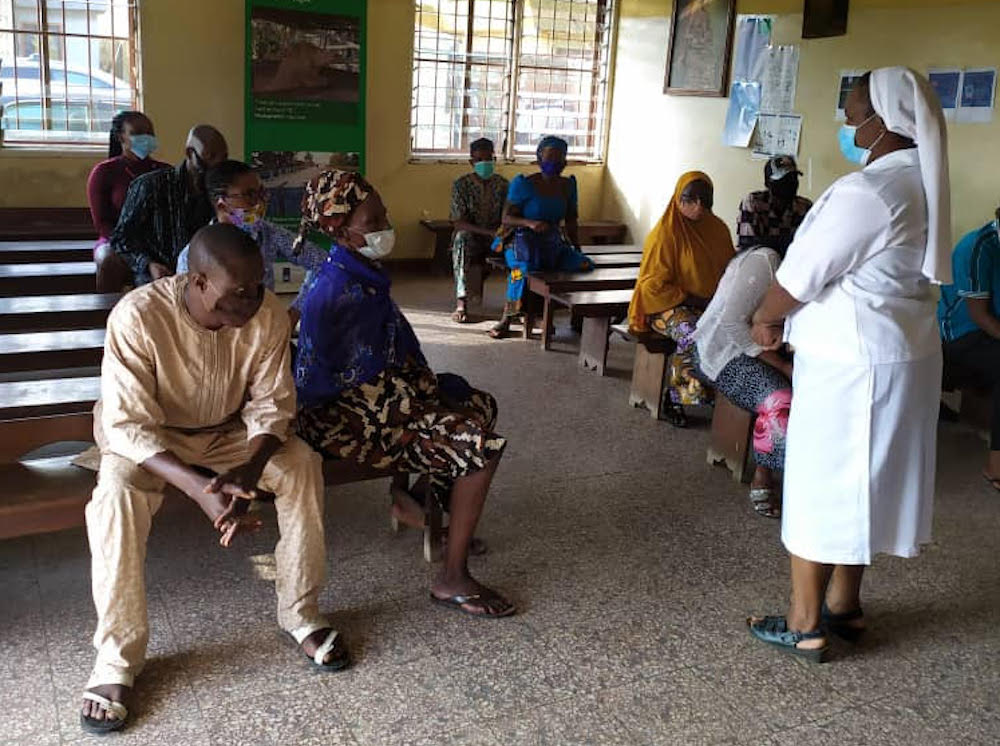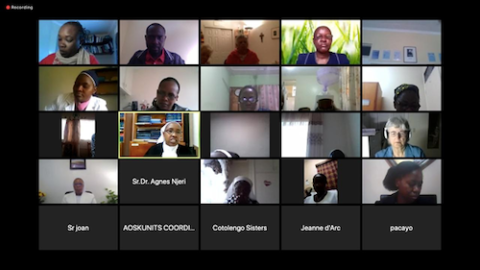
Notre Dame de Namur Sr. Prisca Igbozulike holds a COVID-19 awareness workshop for her patients at St. Catherine of Siena Medical Centre in Lagos, Nigeria. (Patrick Egwu)
As a global body of sisters, our energies are interconnected in our efforts to meet the needs of God's people. Exploring how the global sisterhood is responding to the challenges posed by the current global health crisis of COVID-19 and how it can be more effective was the focus of a webinar July 25 that drew 296 participants from 25 countries. The webinar was cosponsored by The Leaders Guild of Tangaza University and the Association of Sisters of Kenya.
The Leaders Guild is a leadership development program under the Centre for Leadership and Management (CLM), Tangaza University College, founded with support from the Conrad N. Hilton Foundation and DePaul University in Chicago. Its mission is to develop competent and holistic servant leaders who positively impact and transform society by addressing Africa's most pressing needs. Members (associates) include leaders and managers from various sectors of the society, Catholic women religious and laity. (The Hilton Foundation also funds Global Sisters Report.)
Sr. Jane Wakahiu, a member of Little Sisters of St. Francis, is associate vice president of program operations and head of Catholic Sisters Initiative at the Hilton Foundation*. She shared how she envisions sisters' roles at this time in history. She began by describing women religious as bridges, providing avenues for others to pass through, keeping hope alive in the darkness of this pandemic.

View of a webinar about the global sisterhood's response to challenges posed by COVID-19, co-sponsored by The Leaders Guild of Tangaza University and the Association of Sisters of Kenya. (GSR screenshot)
She spoke powerfully about our prophetic role of compassion, quoting Pope Francis: "People today certainly need words, but most of all they need us to bear witness to the mercy and tenderness of the Lord which warms the heart, rekindles hope, and attracts people towards the good. What a joy it is to bring God's consolation to others." She reminded us of the variety of initiatives sisters are taking to reach out in love, mercy and hope to families, youth and elderly, especially those at the margins of society.
Sisters are on the front lines, often without needed protection equipment in health care settings or feeding sites for those without food. They are doing these things while even their own religious communities are facing suffering and pain. Many elder sisters have become sick with the virus and have died; economies are stretched in providing for their own sisters and those who come to their doors because ministries that provided them with income have been shut down. They struggle to find ways to respond with new services for needs that have risen out of the communities that surround them. Throughout, sisters have kept in mind the words of Scripture: "Do not fear, for I am with you; for I am your God. I will strengthen you and help you" (Isaiah 41:10). Staying with those in need, they have strengthened hope, encouraging others that together, hand in hand, we become stronger as communities.
She quoted an African proverb, Ubuntu, "I am because we are" that moves us to work together, to collaborate, to remember that we are never single individuals; we belong to a community. These words push us sisters to find new ways to generate resources to meet the current crises, not just for ourselves, but for the families without work who are unable to provide for their children and relatives.
She also challenged us to "think outside the box," to be creative, become entrepreneurs. She said it is time to join together as congregations to leverage our resources and assets to meet needs around and among us. She encouraged us to collectively engage with other funders, explore partnerships with government, non-governmental organizations, faith-based organizations and the philanthropic community to not only empower ourselves but to empower those with whom we minister. We need to journey together, believing that "the jar of flour will not be used up nor the jug of oil run dry until the day the Lord brings healing on the land!" We need to stop looking at limitations and look to what we have to share.
"I don't have any bread — only a handful of flour in a jar and a little olive oil in a jug. I am gathering a few sticks to take home and make a meal for myself and my son, that we may eat it — and die … the jar of flour will not be used up and the jug of oil will not run dry until the day the Lord sends rain on the land" (1 Kings 12:12 -14).
Advertisement
"Be positive about change," she encouraged, "even though no change is possible without renouncing obsolete models, so that new horizons and possibilities may arise in … mission" ("New Wine in New Wineskins," 2017). It is time, she said, to reinvent ourselves, adapt to what is our "now" and not just prepare for the future, but to prepare the future.
Her remarks sparked not only encouragement, but also practical pathways, evident in feedback that came after the webinar. Sr. Joyce Kiige, a member of the Little Sisters of St. Francis and principal of the Holy Family Basilica Parochial School shared:
I head a primary school here in Nairobi and since the closure of schools in March 2020, finances have been hard to come by. The Ministry of Education and Health have given guidelines on how schools must be before January 2021. … ensure sanitizers and soap dispensers, hand washing points. With no funds at hand, this is a challenge. However, Sister Jane's sharing gave me some insights on different ways of soliciting funds. … I posted my appeal on the school WhatsApp wall and the feedback was tremendous! Parents heeded my call. Some sent me the money, others made pledges, while some promised to buy the items and drop them at school. Thanks, Sister Jane for opening our minds and inviting us to stretch ourselves beyond the challenge. Thanks Leaders Guild-CLM/AOSK for organizing the webinar. God bless.
This testimony really shows that great things happen when we come together and invite others to join us. Never underestimate the power of collaboration.
*An earlier version of this blog post gave an incorrect title for Wakahiu.
[Elizabeth Onoja is a member of the Missionary Sisters of the Holy Rosary. She is the public relations and marketing officer at The Leaders Guild (TLG) at Tangaza University College and is a graduate of the Centre for Leadership and Management at the college. She has also been engaged in working with the youth at the parish level and has great interest in guiding them to uphold ethics in their interactions.]







